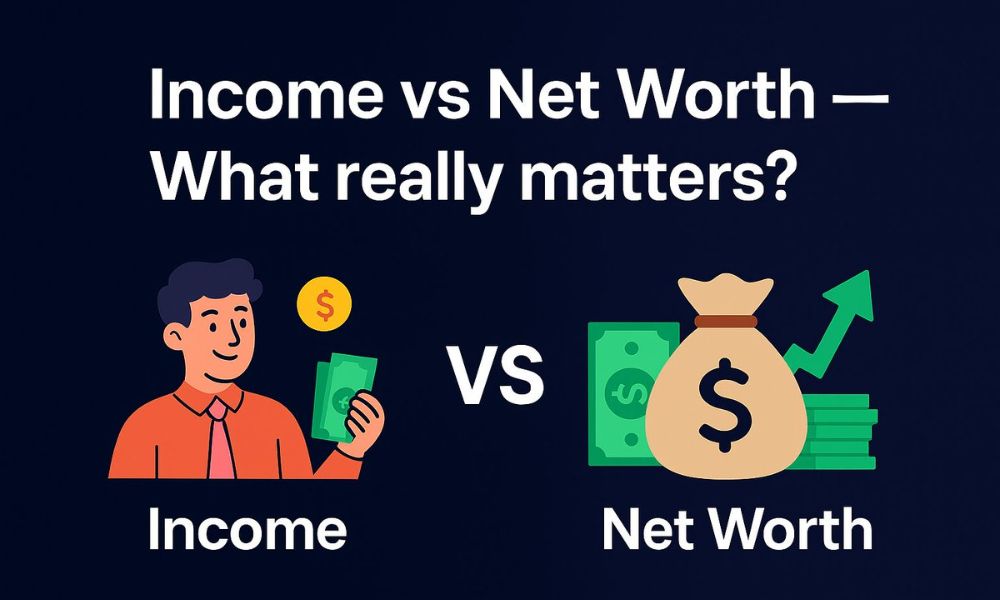In my financial life, understanding Explore Net Worth vs Income .completely transformed the way I manage my money and set goals. As a certified financial planner and founder of Sunflower Financial Planning, I’ve seen many people compare their income level to success without realizing that net worth is a far deeper metric of financial health. Your income shows how much you earn, but your net worth reveals what you truly own versus what you owe. When I first began to calculate my total value—including assets, debt, and investments—it gave me a clear picture of where I stood and how I could save, invest, and use my resources wisely.
Over time, I learned that measuring overall wealth isn’t just about the amount you make, but how effectively you manage it to build lasting stability. The key difference lies in how your net worth grows when your financial health improves—when you save consistently, invest smartly, and make thoughtful choices with your money. Understanding these principles doesn’t just improve your financial planning, it shapes your long-term wealth and peace of mind.
What Does “Income” Actually Tell About Your Financial Health
In my years of financial advising, I’ve learned that income isn’t just the money you receive in your bank account—it’s a reflection of the work performed, capital invested, and the exchange of value between you and your employer. Your gross salary includes base pay, bonuses, allowances, and other payments, but after taxes are deducted, what remains is your net income or take-home pay—the actual compensation you can save, spend, or invest. Whether earned or unearned, your income defines the flow of capital and shapes your ability to grow wealth across various categories of investments and opportunities.
- Amount received can vary depending on job, employer, or investments.
- Gross pay represents total compensation before deductions.
- Net income is your real, usable benefit after taxes deducted.
- Consistently save, invest, and manage average income to secure growth.
- Distinguish between earned and unearned income for effective planning.
Discover how top business personalities achieved success through innovation, vision, and determination.
What Does Net Worth Actually Represent

From my professional experience, I’ve seen how net worth acts as a clear snapshot of a person’s or company’s financial health. It reflects what one owns minus what they owe, showing the difference between assets and liabilities—both financial and non-financial. Whether you’re an individual, institution, or part of larger economic sectors like corporations or governments, your net worth reveals your true value. In popular culture, we often see public figures and celebrities ranked by their wealth, but few realize this figure also depends on investments, loans, hedge funds, structured products, and even alternative assets that influence eligibility for financial opportunities.
- Net worth = what you own – what you owe (the true difference in wealth)
- Includes financial assets, non-financial assets, and outstanding liabilities
- Applies to a person, company, or institution across economic sectors
- Investments, hedge funds, and structured products affect your value
- Commonly used in popular culture to rank public figures and celebrities by wealth
Net Worth and Income: Knowing the Real Difference
Through my experience as a financial advisor, I’ve realized that Net Worth vs Income are two sides of the same coin, yet they measure very different things. Income represents the flow of money you earn at a specific time, while net worth shows your accumulated wealth—the value of what you own minus what you owe. Your home, investments, and cash add to your assets, while credit card debt and other liabilities reduce your financial health. Over the years, I’ve seen how improving your income helps, but it’s consistent saving and wise investing that truly builds net worth and strengthens your sense of long-term stability.
- Primary difference – Income tracks short-term money flow; net worth reflects lasting wealth.
- Net worth = total assets – liabilities (own vs owe).
- Income level indicates earning chances, but not overall financial health.
- Increasing net worth means creating value through smart investments and reducing debt.
- Use both as a reference to monitor progress and align with long-term goals
Why Net Worth Is the Real Measure of Financial Strength
Income is what comes in — your salary, business profits, rent, or dividends. It’s the fuel that keeps your daily life running. But net worth is what stays — the value that’s left when you subtract what you owe from what you own.
You can have a big paycheck and still struggle financially if every dollar goes right back out. On the other hand, someone earning less but saving, investing, and paying off debt is quietly building real wealth. Net worth grows when you make your money work for you — not just when you earn more of it.
The Long-Term View
Income is temporary.
It can disappear with a layoff, a slow business season, or retirement.
Net worth is lasting.
It keeps generating value through assets like real estate, stocks, or ownership in a business.
- Income buys comfort for today.
- Net worth buys freedom for tomorrow.
The real power lies in how you use your income — saving wisely, investing regularly, and avoiding unnecessary debt. That’s how ordinary earnings turn into long-term financial independence.
A Real-Life Example
Consider two people:
- Person A earns $10,000 a month but spends $9,800. They look successful but have little left at month’s end.
- Person B earns $4,000 a month, invests $1,000 consistently, and lives within their means.
A few years later, Person B’s investments start earning money on their own — income that doesn’t depend on a paycheck.
Find out how athletes prepare for major competitions and the mindset behind their success.
Why Income Can Be More Important Than Net Worth
Income is the heartbeat of financial life — the steady rhythm that keeps everything alive and moving. It’s not just about how much you earn; it’s about the constant flow that powers your goals, supports your dreams, and gives you control over your future. While net worth shows what you’ve already built, income shows your potential — your ability to keep building, growing, and achieving. Every month, every paycheck, every deposit is a sign of progress and possibility.
1. Income is your foundation.
Without income, no wealth can stand strong. It pays your bills, fuels your savings, and keeps your lifestyle stable. Even a high net worth means little if there’s no steady cash coming in to handle daily needs. A continuous income stream gives you peace of mind and the flexibility to make smart financial moves.
2. Income creates opportunities.
With a healthy income, you can invest in education, explore business ventures, travel the world, or support your loved ones. Income gives you the freedom to act now — not just wait for assets to grow in the future. It’s liquid, immediate, and adaptable to life’s changes.
3. Income rebuilds wealth.
Even if someone loses money or faces financial setbacks, a solid income can help them rise again. You can always rebuild your savings, repurchase investments, and regain financial strength when your earnings are consistent. Income is renewable — net worth is not.
4. Income reflects growth and capability.
When your income grows, it’s a reflection of your effort, skill, and evolution. Every promotion, client, or business milestone shows that you’re moving forward. Net worth, by contrast, often reflects your past; income reflects your present momentum and future potential.
5. Income gives freedom and dignity.
A reliable income means independence — the power to make your own choices without depending on others. It allows you to support your family, pursue passions, and enjoy life with confidence.
In the end, net worth tells your story, but income writes your next chapter. Net worth is the destination, but income is the journey that gets you there. With steady income, you can save, invest, and create — transforming every dollar earned into a step toward lasting success.
Conclusion
When I first started tracking my income, I realized it covered my daily expenses and bills, but didn’t necessarily make me financially stable or independent in the long run. The important difference between Net Worth vs Income lies in how one helps you handle the present while the other ensures your future. Earning more money feels rewarding, but without a plan to build, keep, and grow it, you end up on a financial treadmill—constantly moving but not progressing. Your income helps you pay what’s due, while your net worth gives you freedom to choose how you want to live and what you want to own.
In my professional journey, I’ve seen people with low earnings but positive net worth, and others with high salaries but negative wealth. The secret is balance: using your steady income to invest in a house, assets, or ventures that make your financial foundation grow stronger. True success isn’t about how much you earn—it’s about how wisely you manage what you keep and how effectively you let it grow over time.
FAQ’S
Q1: What is the difference between Net Worth vs Income?
Income is the money you earn; net worth is what’s left after subtracting what you owe from what you own.
Q2: Which is more important, income or net worth?
Net worth is more important because it reflects your true financial strength, not just your monthly earnings.
Q3: How does my income contribute to my net worth?
Your income builds your net worth when you save, invest, and pay down debts consistently.
Q4: How do I calculate my net worth?
Add up your assets, subtract your liabilities — the result is your net worth.
Q5: What does a positive or negative net worth mean?
A positive net worth means you own more than you owe; a negative one means debts exceed your assets.









